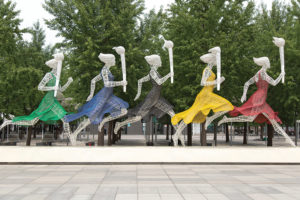Olympics… A Game of the past

This week kicks off the summer Olympics in Tokyo and the question many folks are asking is whether these games/event should proceed under the present circumstances?
The bigger question for me is ….do we really need the Olympics and the costs associated with these events that only last three weeks? The Olympic torch has landed in Japan and it is getting ready for the games, but should these games go on or get postponed due to the COVID-19 outbreaks and the new variants that seem to be very serious and should be taken with caution? There are known cases of COVID at the time that I am writing this column and many of these cases are being kept in the dark.
Japan is experiencing its worst coronavirus surge since a peak in January, with daily case rates now topping about 6,000. The Japanese government recently extended a state of emergency in the game host city of Tokyo and a few other centers. A successful inoculation effort was widely seen as an important benchmark for Japan’s hosting of the games, but so far only a little more than 1 percent of Japan’s population is fully vaccinated against COVID-19.
The Japanese government and the International Olympic Committee (IOC) have promised safe and secure games, with stringent health protocols. Foreign fans banned from attending the Tokyo games, but the event will still draw some 15,000 athletes, along with thousands of coaches, trainers, support personnel, and members of the media. However, a most recent decision this week by the IOC is some fans will be allowed but monitored at most of these events.
So, without foreign fans, some of the economic benefits for Japan are already blunted, which is why more and more people in Japan are questioning the need for the games to go on…not only are the folks in Japan questioning this event but much of the global population is also scratching their heads and wondering why. The recent numbers behind other host countries and the benefits that were left behind were very minimal at best. This also opens the question of whether the Olympics should be held in one location at all times.
The Infrastructure that is left behind in these host cities in many cases is one positive thing. Hosting the Olympics increasingly has been an impetus for addressing some of the host city’s pressing needs, especially in terms of infrastructure. Street and bridges are refurbished or, like mass-transit lines and public buildings, constructed anew. This particular portion of a possible benefit is good as long as when the events leave, the locals are stuck with picking up the tab which has happened in many cases in the past. If these costs are picked up and not left on the taxpayer, l personally do agree that this can be a game changer for a host city.
Determining a games success or failure come down to its legacy, the measuring-stick concept developed by the surprisingly large body of academics concerned with the Olympics. Most of them agree that legacy involves a games long term planned and unplanned, positive and negative political, economic, social, cultural, infrastructure, and environmental impacts on a city. The sought-after positive legacy outcomes include urban renewal, increased tourism and employment, enhanced city image and reputation, improve public welfare, and a renewed sense of community. Among the negative outcomes measured are ongoing debt from construction, infrastructure that becomes unnecessary after the games, increases rent, and unjust displacement of citizens.
There are winners and losers when it comes to hosting the Olympics…
Winners… the thieving suburbs have grown around most Olympic sites where fields and arenas have continued to be used by local groups and citizens. The transit infrastructure changes and upgrades have also benefited most cities and their future commuting patterns along with renewed bridges and roads that in many cases needed a facelift or a complete overhaul.
Losers… In many cases some of the new infrastructure complexes, in particularly Olympic stadium in Montreal, have been an eye soar and not used much, with this complex taking up valuable space that could have been used for housing or other workable sites for the citizens of Montreal. With this Olympics in Tokyo there are due to COVID-19 a great many losers, whether its athletes not being able to compete in these games, but the biggest loser is the country of Japan because the economic benefits that would have been accrued, just will not be there this time.
I can point out so many more negatives, but there are as well some good things…the personal lifelong commitment by these athletes and their personal accomplishments. Many have had success and failure, but the thrill of making it to an Olympic is and could be life changing for many of these athletes. Let’s face it the Olympics that we once knew is no longer the prize event that we would look forward to every four years, it’s time to move on from these events or have them in one host country every four years.
My recommendation for the Olympics is to have it in one host country every four years which would make it easier on all concerned and the performers and preparations for these games would be much less an economic drain on many countries. To have a permanent summer host country and a permanent winter country host the Olympics would be a winning formula.
Maybe Greece?
One Olympics in One Country all the time…
That’s a winning formula!
Vincent Black/MS








Redes Sociais - Comentários